APS Spotlight
2020 APS Mentor Awards
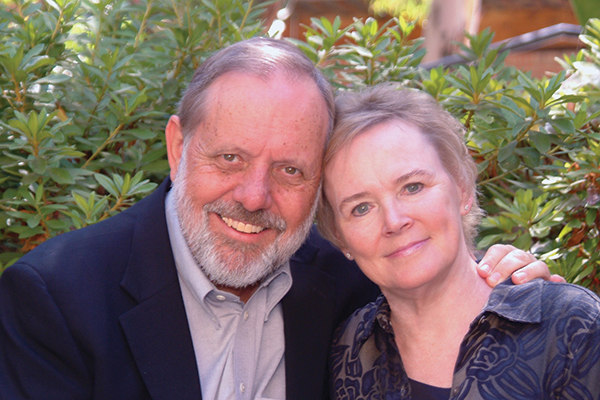
The APS Mentor Award recognizes the lifetime achievement of psychology researchers and educators who have shaped the future directions of science by fostering the careers of students and colleagues. Four psychological scientists—all APS Fellows—have been selected to receive the award in 2020. Beyond their individual contributions to diverse areas of research, these scholars’ dedication to their students and colleagues has fostered a thriving global community of psychological scientists.
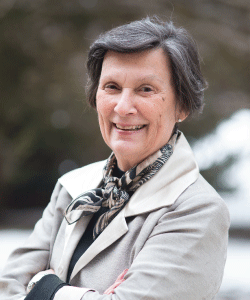
Toni C. Antonucci
University of Michigan
Fostering interests and broadening perspectives. Offering feedback and inspiring growth. Making introductions, facilitating opportunities, guiding grant applications, sharing “incredibly rich” data, and above all creating a sense of family. As a mentor to dozens of current and former graduate students, postdoctoral scholars, and colleagues over the decades, Toni C. Antonucci is “a remarkable role model of leadership and achievement in the field,” said Hannah L. Giasson, a postdoctoral research fellow at Stanford, in a nomination for the award. “I am immensely appreciative of the value for ongoing growth that she imparted in me and continues to inspire through her own achievements.”
Antonucci is a premier scientist working at the nexus of life-span developmental psychology and survey research. She is the Elizabeth M. Douvan Collegiate Professor in the Department of Psychology at the University of Michigan, where she has been since 1979. She serves as senior research professor at the university’s Institute for Social Research and program director for its Life Course Development Program, where she leads large-scale, longitudinal research on how relationships and health change across the life span. To meet the challenges inherent in such complex investigations, her interdisciplinary work has brought together colleagues from psychology, anthropology, neuroscience, medicine, public health, gerontology, sociology, and social work.
A native Brooklynite, Antonucci began studying older people and aging as a graduate student in developmental psychology. She “has been a force behind this historically critical transition of the field,” said Patricia A. Reuter-Lorenz, the Michael I. Posner Collegiate Professor of Psychology and Neuroscience at Michigan. “Her seminal work on social networks and aging has been a cornerstone and catalyst of the growth in this area of life-span and aging research.” During Antonucci’s time at Michigan, she has led dozens of research projects involving aging, health, and social relations while contributing generously to leading journals and professional organizations.
In addition to providing others with practical support, Antonucci fosters community among her colleagues. Former mentees remember her lab as a welcoming environment in which scholarly and personal milestones alike were celebrated, and everyone’s contributions were recognized. A strong advocate of diversity and inclusion, she seeks out mentees from many backgrounds. She has fostered relationships with graduate students from around the world, focusing her attention particularly on training opportunities in developing countries.
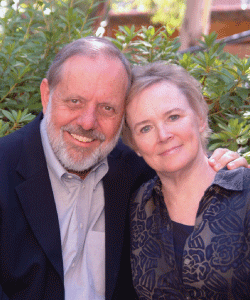
Elizabeth Ligon Bjork and Robert A. Bjork
University of California, Los Angeles
Friday mornings changed forever for UCLA psychology scholars in 1979, when APS James McKeen Cattell Fellows Elizabeth and Robert Bjork established a weekly research meeting that quickly became legendary. “CogFog,” which meets throughout the year, including summers, attracts a mix of faculty, postdocs, and graduate students for a spirited discussion characterized by good-natured debate and rigorous analysis alike—“part warm family gathering over donuts, part academic trial-by-fire (in the friendliest possible way),” said APS Fellow Michael C. Anderson of the University of Cambridge. For this former graduate student and generations of others, CogFog was a formative experience and highlight of every week, and it went on to inspire incarnations at universities around the world. “My own lab is called CogFogEast,” said APS Fellow Janet Metcalfe of Columbia.
Collaborators, comentors, and now corecipients of the APS Mentor Award, the Bjorks are pillars of cognitive research whose work on subjects such as desirable difficulties in learning has left a profound impact on psychological science. Since arriving at UCLA in 1974, they have also codirected a lab for the study of learning and memory. “One of the most extraordinary aspects of being part of their lab is that you weren’t just being mentored by Bob and Elizabeth,” said Veronica Yan of the University of Texas at Austin. Rather, the two “set up a highly stimulating and collaborative environment for all their lab members—the undergraduates, the graduates, the postdocs, and anyone else at UCLA who is interested in memory research.”
In addition to their research contributions, the Bjorks as mentors have inspired the values, practices, skills, and personal traits in their mentees that encourage a lifelong love of science and a global community of colleagues. Despite being accomplished scientists and leaders in their field, they exude a disarming warmth and openness, their students say. Former mentees describe them as “bottomless pits of knowledge,” “inseparable in their contributions to their students’ development,” Minnesota nice.”
Their egalitarianism and respect also enable mentees to comfortably share ideas. “Whereas in some institutions, faculty guard their students’ time and may limit their interaction with other laboratories, the Bjorks do the opposite: They believe that collaboration brings more skill, wisdom, and ideas to the student and allows them to blossom,” noted Anderson.
The impact that Elizabeth and Robert Bjork have had on psychology cannot be overstated. Of the more than 80—and growing—honors, graduate, and postdoctoral students and scholars the two have comentored at UCLA, a staggering 57 (70%) have gone on to careers in academia related to learning and memory. Their unique partnership and approach provide an atmosphere of support in which scientific achievement thrives.
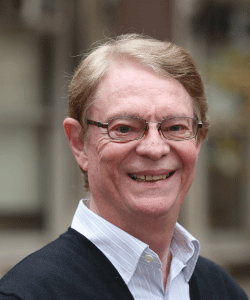
E. Tory Higgins
Columbia University
Testament to the positive influence of APS William James Fellow E. Tory Higgins as a mentor runs wide and deep. He is “passionate about science and getting to the truth,” “a fun and constant source of inspiration,” “one of a kind—always searching for a better idea, always pushing his theories to the limit,” according to various former students in nominating letters. Contagiously enthusiastic and able to spot breakthrough potential in even “failed” studies, he became known “as a kind of ‘foster father’ for wayward graduate students” who went on to thrive after being brought into his lab, said James Cornwell of the US Military Academy at West Point. “To a person, his students feel supported, lifted up, encouraged, energized, and stimulated,” said Abigail A. Scholer of the University of Waterloo and APS Fellow Daniel C. Molden of Northwestern University. “He treats his students as equal partners in an intellectual pursuit.”
A professor of psychology and business and director of the Motivation Science Center at Columbia, Higgins has won many of the highest awards in psychological science for his work on knowledge activation and self-regulation. Besides being one of the most highly cited social psychologists in the field (more than 76,000 citations, according to Google Scholar), he has fostered countless students’ research and scholarship even in areas outside of social psychology. “For many graduate advisors, the task is to get the student to a PhD. For Tory, the task was always to get the student a job,” said one former graduate student. More than 35 of Higgins’s former students are affiliated with academic institutions around the world, but “Tory has always supported his students in following the career trajectories that made the most sense for them, even if that wasn’t academia,” said a current graduate student. “He respects our individual talents and interests, he never stops encouraging us, and all the while he exemplifies what social psychology (and behavioral science writ large) can be,” said APS Fellow Timothy J. Strauman of Duke University.
Perhaps the primary reflection of the deep impact Higgins has on his students is the regular “Labfest” conference that brings together current and former students from both academic and nonacademic sectors, fostering further opportunities for collaboration and enrichment. Having joined the Higgins Lab, many former students never want to leave. Thanks to his ongoing dedication to them and the field, they never have to.
Learn more about the APS Mentor Award and past recipients, and nominate a candidate for a future Mentor Award.
Related content
-

Video: The 2020 and 2021 APS Lifetime Achievement Awards
Words of wisdom from all 21 recipients of APS’s awards for major contributions to psychological science.
-
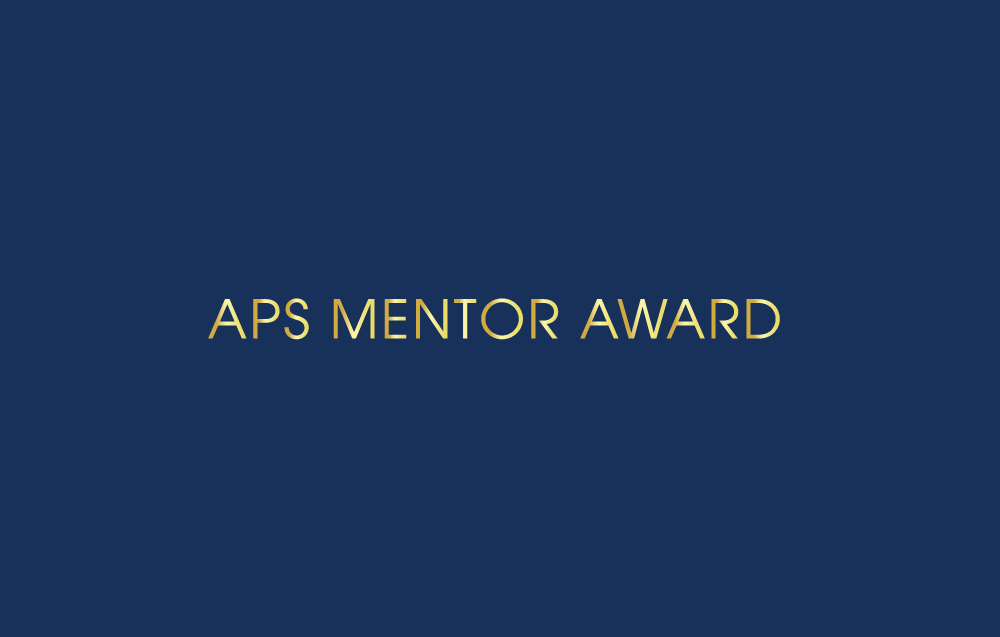
APS Mentor Award
The APS Mentor Award honors the importance of mentoring in our field as well as the dedication and impact of individuals with a distinguished record of teaching, advising, and encouraging students and colleagues.





APS regularly opens certain online articles for discussion on our website. Effective February 2021, you must be a logged-in APS member to post comments. By posting a comment, you agree to our Community Guidelines and the display of your profile information, including your name and affiliation. Any opinions, findings, conclusions, or recommendations present in article comments are those of the writers and do not necessarily reflect the views of APS or the article’s author. For more information, please see our Community Guidelines.
Please login with your APS account to comment.